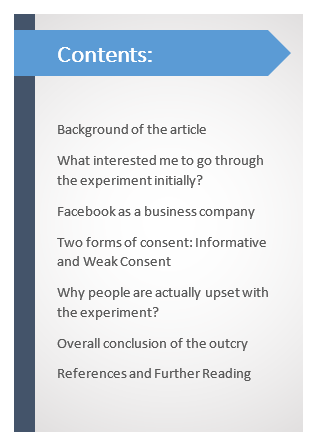 We wanted to see if we could make you feel happy without you noticing. We succeeded. We wanted to see if we could make you feel sad without you noticing. We succeeded again. Hypothesis proved !
We wanted to see if we could make you feel happy without you noticing. We succeeded. We wanted to see if we could make you feel sad without you noticing. We succeeded again. Hypothesis proved !
For one week in January 2012, the data scientists working for the social network customized the mysterious algorithm to meddle with the news feed that appears on user’s screen as soon he/she hits the website. All this was done quite secretly as a part of an experiment providing evidence of massive-scale emotional contagion through social networks.
The experiment was conducted by a team of three people, Adam D. Kramer from Core Data Science Team, Facebook and Janie Guillory and Jaffrey Handcock from Cornell University over a half a million, 689,003 to be more precise, subjects (users). The experiment manipulated the extent to which people were exposed to emotional expressions in their news feed without making them aware about the changes and the researchers came out with a conclusion that emotional states can be transferred to others via emotional contagion, leading people to experience the same emotions without their awareness.
Now, a great deal has been said about this psychology experiment in past one week over news journals, interviews and emails – what was the experiment, how did they do it, what were the conclusions, was the experiment ethical, couldn’t the experiment been done other way etcetera etcetera. But I am taking a different turn over the matter, take a little step back when the experiment might have in the stage of final approval and would like to dig into the motive behind the experiment – the why question instead of what, how, who and when inquiries over the matter.
Having been a student of psychology for a semester (yeah, it was an elective course), this outcry made me look into the mayhem behind it as it involved few terms like ‘emotion’, ‘psychology experiment’, ‘state of mind’ and instead of coming up to either of the side, because neither am I a data scientist nor am I legal advisor, I choose a different way to look at the things.
The very first thing that pinched me that Facebook isn’t a psychology department in a university, then why ‘Emotional Contagion’? The networking giant wanted to know whether a picture of your friend posing with a beautiful actress makes you jealous or happier (humanity still exists!) or the album of birthday jubilation triggers the fear of missing out (famous as F.O.M.O.)! And they wanted to know which of these actually happens and when and how often. However the bottom-line must have been the research to check whether the emotions spread and study the parameters associated with the expansion of emotions. But why? After all, Facebook is a business and whatever it does, it does it benefit Facebook. I am reminded of a line which a read somewhere on the internet in this context, When GE or Boeing does research, we learn more about flight. When Facebook does research, they learn more about Facebook. They just don’t do these experiments out of academic interest, but they do it for money (make a product better for its customers, doesn’t it mean the same?).
why ‘Emotional Contagion’? The networking giant wanted to know whether a picture of your friend posing with a beautiful actress makes you jealous or happier (humanity still exists!) or the album of birthday jubilation triggers the fear of missing out (famous as F.O.M.O.)! And they wanted to know which of these actually happens and when and how often. However the bottom-line must have been the research to check whether the emotions spread and study the parameters associated with the expansion of emotions. But why? After all, Facebook is a business and whatever it does, it does it benefit Facebook. I am reminded of a line which a read somewhere on the internet in this context, When GE or Boeing does research, we learn more about flight. When Facebook does research, they learn more about Facebook. They just don’t do these experiments out of academic interest, but they do it for money (make a product better for its customers, doesn’t it mean the same?).
A huge outcry have happened not on the experiment idea but the way it was conducted, without the consent of people. Really? I, and all of you have agreed to the terms of service to Facebook’s Data Use Policy, isn’t it? Yes, it is a pure fiction that a person rarely agrees with a policy such as this, yet we use this fiction all the time. However, the experiments is rationally legal as what have been said in the paper, published in the prestigious Proceedings of National Academy of Science, is based on competent approval. There has been several studies on Facebook data, but this was different, this one set out to manipulate the data. This story has put two conceptions of consent into stark contrast, the informed consent that is required in academic research and the weak consent that is implied whenever user agrees to the Terms of Service.
 In the world of business, the FB method was very common one but given that they used academic forum for publishing their research, shouldn’t have they adopted a stringent consent measures?
In the world of business, the FB method was very common one but given that they used academic forum for publishing their research, shouldn’t have they adopted a stringent consent measures?
The experiment if looked at with a business purpose (so what do you think the reason FB might have for the research?), opens up a new dimension of possible advertising opportunities. If a company can make people associate with their happiness, people will line up to buy the happiness. Perhaps it could design a new News Feed that shows us positive posts from our friends in order to makes us happy and encourage us to spend more time on the site!
But the bottom level remains that the moves like these keep on pushing boundaries, and this is one of the reasons people are upset. People will complain for this a while but this mayhem will gradually fade out, and Facebook will still have a billion users and certainly it have a new way to make more money after the experiment.
References and further readings:
- Paper in which experiment was published
- Google Controversy
- Facebook full data use policy
- Data Science: What Facebook Controversy is Really About
- Everything We Know About Facebook’s Secret Mood Manipulation Experiment
- Emotional Contagion On Facebook? More Like Bad Research Method
- Stop Freaking Out About Facebook ‘Psychological Experiments’

